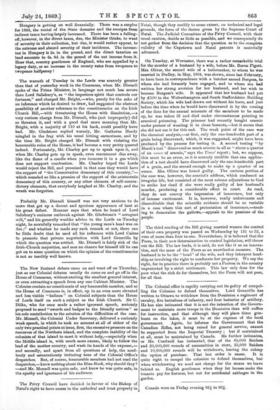On Tuesday, at Worcester, there was a rather remarkable trial
for the murder of a husband by a wife, before Mr. Baron Pigott. Mrs. Oliver, the second wife of a boilermaker, to whom he was married in Dudley, in May, 1864, was shown, since last February, to have been in correspondence with a butcher named Burgess, to whom she had formerly been engaged, and to whom she had written her strong aversion for her husband, and her wish to become Burgess's wife. It appeared that her husband had put by £100 in the Wolverhampton and South Staffordshire Building Society, which his wife had drawn out without his leave, and just before the time when he "would have discovered it by the coming of the date for the annual accounts of the members to be made up, he was taken ill and died under circumstances pointing to arsenical poisoning. The prisoner had recently bought arsenic under pretext of wanting it to clean bonnets,—but it seems that she did not use it for this end. The weak point of the case was the chemical analysis,—at first, only the one-hundredth part of a grain being discovered, which, it was suggested, might have been produced by the process for testing it. A second testing "by Marsh's test" discovered as much arsenic in all as "about a quarter of an ounce of arsenic," says the Times' report ; but, we suppose, this must be an error, as it is scarcely credible that one applica- tion of a test should have discovered only the one-hundredth part of a grain, and the second enough to make up a quarter of an ounce. Mrs. Oliver was found guilty. The curious portion of the case was, however, the convict's address, which confessed an irregular life, but consisted of the most solemn adjurations to God to strike her dead if she were really guilty of her husband's murder, producing a considerable effect in court. As read, they do not convey the impression of innocence, but only of intense excitement. It is, however, really unfortunate and discreditable that the scientific evidence should be so variable in a case where this sort of protestation of innocence,—tend- ing to demoralize the gallows,—appeals to the passions of the people.






























 Previous page
Previous page